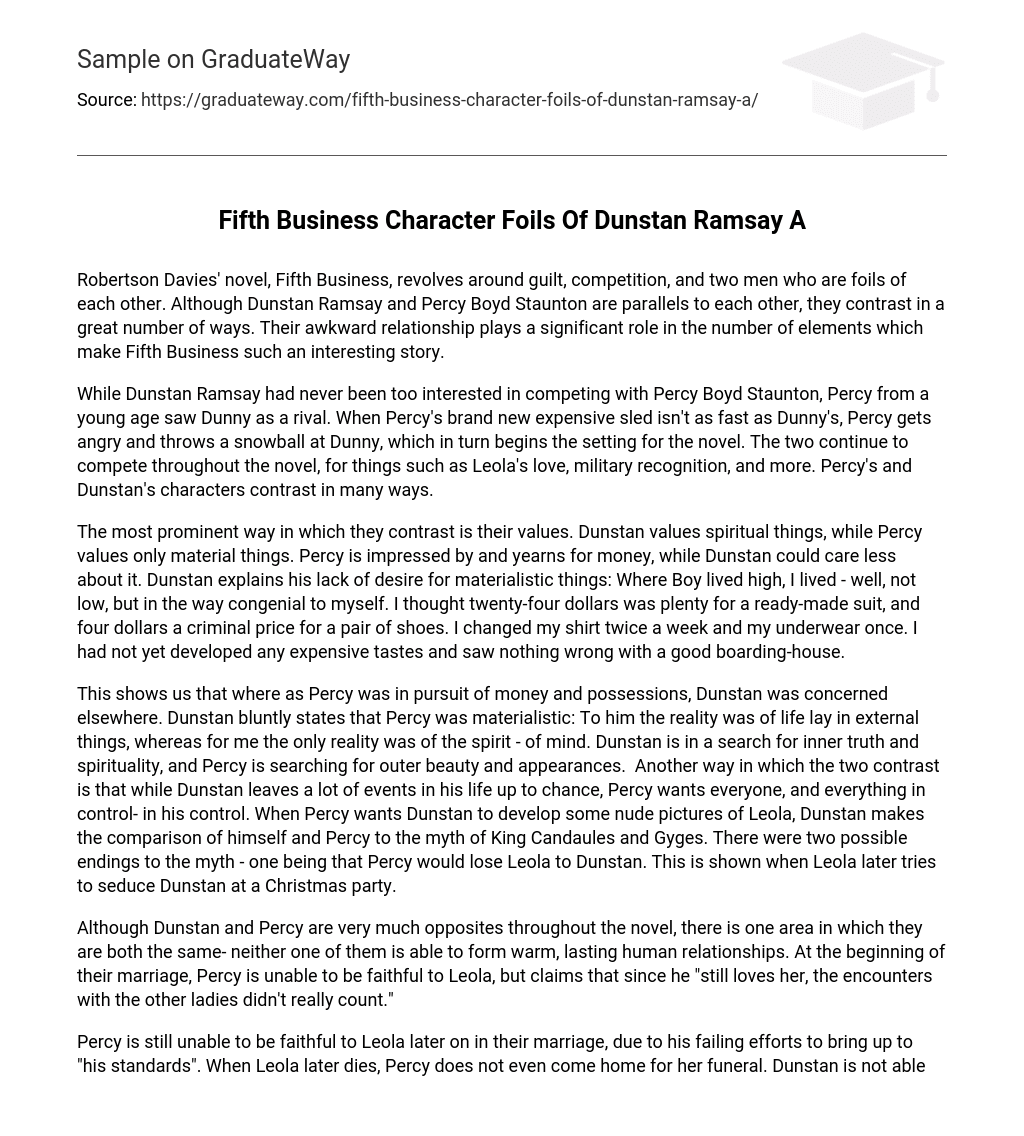Robertson Davies’ novel, Fifth Business, centers on guilt, competition, and the contrasting personalities of two men. Dunstan Ramsay and Percy Boyd Staunton are both similar and different, which adds depth to the story. Their complex relationship plays a crucial part in making Fifth Business an intriguing narrative.
Although Dunstan Ramsay has never had much interest in competing with Percy Boyd Staunton, Percy has viewed Dunny as a rival since a young age. When Percy’s newly purchased and costly sled proves to be slower than Dunny’s, he becomes enraged and hurls a snowball at Dunny, thus setting the stage for the novel. Throughout the narrative, the two characters persistently compete for various things, including Leola’s affection, military accolades, and more. Percy and Dunstan’s personalities demonstrate contrasting qualities in numerous ways.
The primary contrast between them lies in their values. While Dunstan values spiritual matters, Percy solely values material possessions. Percy is impressed by and desires money, while Dunstan has no interest in it. Dunstan explains his lack of desire for materialistic things: Where Boy lived extravagantly, I lived in a way that suited me. I believed twenty-four dollars was enough for a ready-made suit, and four dollars was too much for a pair of shoes. I changed my shirt twice a week and my underwear once. I had not yet developed any expensive preferences and saw nothing wrong with a good boarding-house.
This passage illustrates the contrasting priorities of Percy and Dunstan. Percy is focused on acquiring material wealth and possessions, while Dunstan is more interested in inner truth and spirituality. Percy values external things as the true essence of life, whereas Dunstan believes that reality lies in the spirit and mind. Additionally, Dunstan tends to leave events to chance, while Percy prefers to have control over everything and everyone. This divergence is exemplified when Percy asks Dunstan to develop nude pictures of Leola, prompting Dunstan to compare their relationship to the myth of King Candaules and Gyges. In this myth, there are two possible outcomes, one being that Percy would lose Leola to Dunstan. This possibility is later evidenced when Leola attempts to seduce Dunstan at a Christmas party.
Despite being complete opposites throughout the novel, both Dunstan and Percy share a commonality – their inability to establish enduring and affectionate relationships with other people. In the early stages of their marriage, Percy demonstrates his inability to remain faithful to Leola, yet he tries to justify his actions by stating that his encounters with other women do not matter as he still loves Leola.
Percy’s inability to be faithful to Leola in their marriage stems from his constant dissatisfaction with her inability to meet his expectations. Even after Leola’s death, Percy doesn’t bother to come home for her funeral. Similarly, Dunstan struggles to form lasting relationships because he refuses to let anyone exert control over him, reflecting his aversion to his own mother’s influence. He rejects Diana’s proposal because he doesn’t want another mother figure in his life, even if she is young and attractive. Rather, Dunstan aims to assert his independence and avoid becoming someone else’s dependent once again after losing his own mother. Despite their differences, Dunstan and Ramsay are parallel characters who bring excitement and stability to the novel through their contrasting personalities. They both serve as ideal best friends and fierce adversaries.





